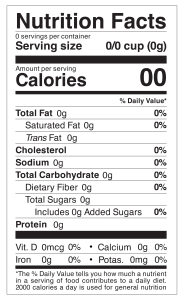As children return to school, parents are seeking wholesome snacks to serve. Snack bars for children are a convenient option as they are manageable in size. Two OU kosher-certified companies, Kind and MadeGood, offer flavorful, nutritious and allergen-free snack bars. Their names speak to their respective values, to create a “kinder” society and “make good” to others.
Nutrition Information
When discussing the properties of children’s snack bars, the key elements to scrutinize are the sugar, fiber and protein content. These essentials, in proper proportions, are needed to round out a child’s diet. Sugar gives energy, fiber protects the gut and protein contributes to muscle strength.
Jennifer Anderson, a registered dietician and mother of two, elaborates on snack-bar nutrition. Based on the American Heart Association’s recommendation that less than 6 teaspoons of sugar for children is ideal, she says that you should aim for around 5 grams of sugar. This amount provides the necessary energy without excess calories.
Regarding fiber, she recommends 4-5 grams per snack bar. This amount will help the child maintain a healthy gut. For more age-specific data, the Cleveland Clinic charts the recommended intake amounts for boys and girls from ages 1 to 19 years.
For protein, she recommends around 4 grams based on the recommended daily intake of 14-20 grams for younger children and 20-35 grams for older kids. This will keep a child satisfied, and as Healthline notes regarding protein, it will help build muscle mass.
Kind

Kind has released two back-to-school snack bars: The Kind Kids Chocolate Bar and the Kind Kid’s Blueberry Muffin Bar.
Daniel Lubetzky is the founder of Kind. As the son of a Holocaust survivor and author of The New York Times bestselling book Do the Kind Thing, he created a thriving food company that is guided by the core principles of kindness and giving back. For instance, during the COVID-19 pandemic, they donated 5 million bars worldwide. In addition, they created a program to match corporate donors to support frontline workers, including nurses, firefighters, and EMTs on an ongoing basis.
Their main undertaking of kindness, however, still exists in their main business of snacks. One example is their recent unveiling of two kid-friendly bars. The first one is the Kind Kids Chocolate Bar that’s inviting with a chocolatey kick. The second one is the Kind Kids Blueberry Muffin Bar which combines oat milk and blueberries for a fruity taste. Both have all three important elements—sugar, protein and fiber.
MadeGood
MadeGood, founded by siblings Nima, Salma and Sahba Fotovat, is guided by principles of goodness. One example is their Share Some Good contest. Students can nominate their school if they feel it can do good for society. Should the student win, the school receives $20,000 and the student $2,000. A nominated teacher who wins receives $200 and the student is awarded a one-year supply of MadeGood bars. However, their core kindness relates to their goodness in making school-safe snack bars. This comes with no compromise on taste as they use the finest of ingredients. The bars also have the right proportions of sugar, fiber and protein.
One particular bar in their repertoire is the MadeGood Chocolate Chip Granola Bar. It’s school-friendly, gluten-free, vegan and full of taste. Another bar is the MadeGood Cookies & Creme Granola Bar. It shouldn’t be difficult to sell your child on this alluring bar.
Conclusion
Finding back-to-school flavorful, nutritious and allergen-free snack bars is within reach. Two OU kosher-certified companies, Kind and MadeGood, have invested in these types of kid-friendly snacks that align with their overall values of bettering society.




